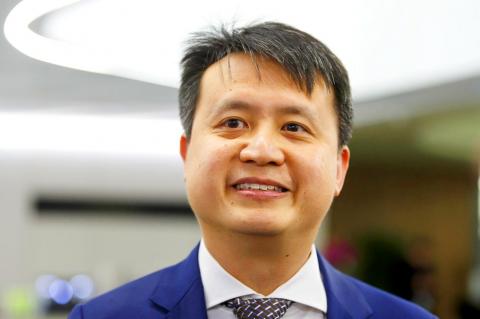The US defeated a Chinese bid to run the UN’s World Intellectual Property Organization (WIPO) as Washington seeks to convince nations of the threat posed by Beijing taking a more assertive role on the global stage.
The US-backed candidate, Daren Tang (鄧鴻森) of Singapore, on Wednesday won by a vote of 55-28 in Geneva, Switzerland, over Chinese candidate Wang Binying (王彬穎) among the governments voting for the leadership of the WIPO, which helps develop cross-border policies on intellectual property.
While the agency is relatively obscure, the leadership fight had become a crucial battleground in the bid by US President Donald Trump’s administration to counter China’s growing influence and assertiveness in international agencies and the UN.

Photo: EPA-EFE
The US Department of State had made it a top priority to stop China’s candidate from winning the election.
The fight underlines the growing intensity of the US-China rivalry even after the two nations reached a “phase one” trade agreement.
It was also a reversal of fortune after the US failed to stop a Chinese candidate from taking leadership of another UN specialized agency, the Food and Agricultural Organization. That prompted a new focus by the Trump administration to make its voice heard in multilateral organizations.
“Mr Tang is an effective advocate for protecting intellectual property, a vocal proponent of transparency and institutional integrity, and a leader who can unify WIPO member states by forging consensus on difficult issues,” US Secretary of State Mike Pompeo said in a statement.
Earlier, Pompeo had made clear Washington’s stance that a Chinese citizen must not be allowed to take the job.
US officials decried China’s history of intellectual-property theft, while US Ambassador to the UN Andrew Bremberg made the WIPO fight a top priority.
Writing in the Financial Times last week, US Office of Trade and Manufacturing Policy Director Peter Navarro said that China should not lead the WIPO because its commitment to protect intellectual property does not match Western standards.
He also accused China of wanting greater influence over the UN to advance its political objectives, such as isolating Taiwan.
Several candidates were running to lead the WIPO and succeed Francis Gurry, an Australian who has led the organization since 2008.
The US had backed Tang, the chief executive of the Intellectual Property Office of Singapore who has a master’s degree from Georgetown University in Washington.
The fight between the US and China over the job got nasty, with Chinese officials arguing that the US was trying to suppress its rise.
Beijing accused the US of threatening to withhold World Bank and IMF money to countries that voted for the Chinese candidate, a claim the US denied.

DEFENDING DEMOCRACY: Taiwan shares the same values as those that fought in WWII, and nations must unite to halt the expansion of a new authoritarian bloc, Lai said The government yesterday held a commemoration ceremony for Victory in Europe (V-E) Day, joining the rest of the world for the first time to mark the anniversary of the end of World War II in Europe. Taiwan honoring V-E Day signifies “our growing connections with the international community,” President William Lai (賴清德) said at a reception in Taipei on the 80th anniversary of V-E Day. One of the major lessons of World War II is that “authoritarianism and aggression lead only to slaughter, tragedy and greater inequality,” Lai said. Even more importantly, the war also taught people that “those who cherish peace cannot

STEADFAST FRIEND: The bills encourage increased Taiwan-US engagement and address China’s distortion of UN Resolution 2758 to isolate Taiwan internationally The Presidential Office yesterday thanked the US House of Representatives for unanimously passing two Taiwan-related bills highlighting its solid support for Taiwan’s democracy and global participation, and for deepening bilateral relations. One of the bills, the Taiwan Assurance Implementation Act, requires the US Department of State to periodically review its guidelines for engagement with Taiwan, and report to the US Congress on the guidelines and plans to lift self-imposed limitations on US-Taiwan engagement. The other bill is the Taiwan International Solidarity Act, which clarifies that UN Resolution 2758 does not address the issue of the representation of Taiwan or its people in

US Indo-Pacific Commander Admiral Samuel Paparo on Friday expressed concern over the rate at which China is diversifying its military exercises, the Financial Times (FT) reported on Saturday. “The rates of change on the depth and breadth of their exercises is the one non-linear effect that I’ve seen in the last year that wakes me up at night or keeps me up at night,” Paparo was quoted by FT as saying while attending the annual Sedona Forum at the McCain Institute in Arizona. Paparo also expressed concern over the speed with which China was expanding its military. While the US

‘FALLACY’: Xi’s assertions that Taiwan was given to the PRC after WWII confused right and wrong, and were contrary to the facts, the Ministry of Foreign Affairs said The Ministry of Foreign Affairs yesterday called Chinese President Xi Jinping’s (習近平) claim that China historically has sovereignty over Taiwan “deceptive” and “contrary to the facts.” In an article published on Wednesday in the Russian state-run Rossiyskaya Gazeta, Xi said that this year not only marks 80 years since the end of World War II and the founding of the UN, but also “Taiwan’s restoration to China.” “A series of instruments with legal effect under international law, including the Cairo Declaration and the Potsdam Declaration have affirmed China’s sovereignty over Taiwan,” Xi wrote. “The historical and legal fact” of these documents, as well